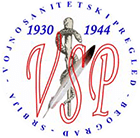Issue: Vojnosanit Pregl 2016; Vol. 73 (No. 7)
In vitro assessment of antiproliferative action selectivity of dietary isothiocyanates for tumor versus normal human cells
Authors:
Aleksandra Konić Ristić*, Tatjana Stanojković†, Tatjana Srdić-Rajić†, Sanda Dilber‡, Brižita Djordjević§, Ivan Stanković§, Zorica Juranić†
Download full article PDF
Background/Aim. Numerous epidemiological studies have shown beneficial effects of cruciferous vegetables consumption in cancer chemoprevention. Biologically active compounds of different Brassicaceae species with antitumor potential are isothiocyanates, present in the form of their precursors – glu-cosinolates. The aim of this study was to determine the selec-tivity of antiproliferative action of dietary isothiocyanates for malignant versus normal cells. Methods. Antiproliferative activ-ity of three isothiocyanates abundant in human diet: sulforap-hane, benzyl isothiocyanate (BITC) and phenylethyl isothiocy-anate, on human cervix carcinoma cell line – HeLa, melanoma cell line – Fem-x, and colon cancer cell line – LS 174, and on peripheral blood mononuclear cells (PBMC), with or without mitogen, were determined by MTT colorimetric assay 72 h af-ter their continuous action. Results. All investigated isothiocy-anates inhibited the proliferation of HeLa, Fem-x and LS 174 cells. On all cell lines treated, BITC was the most potent inhibi-tor of cell proliferation with half-maximum inhibitory concen-tration (IC50) values of 5.04 mmoL m-3 on HeLa cells, 2.76 mmol m-3 on Fem-x, and 14.30 mmol m-3 on LS 174 cells. An-tiproliferative effects on human PBMC were with higher IC50 than on malignant cells. Indexes of selectivity, calculated as a ratio between IC50 values obtained on PBMC and malignant cells, were between 1.12 and 16.57, with the highest values ob-tained for the action of BITC on melanoma Fem-x cells. Con-clusion. Based on its antiproliferative effects on malignant cells, as well as the selectivity of the action to malignant vs normal cells, benzyl isothiocyanate can be considered as a promising candidate in cancer chemoprevention. In general, the safety of investigated compounds, in addition to their antitumor potential, should be considered as an important criterion in cancer chemo-prevention. Screening of selectivity is a plausible approach to the evaluation of safety of both natural isothiocyanates and synthe-sised analogues of these bioactive compounds.

